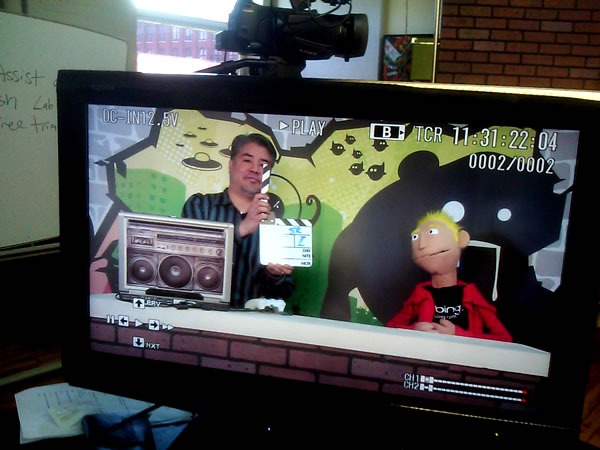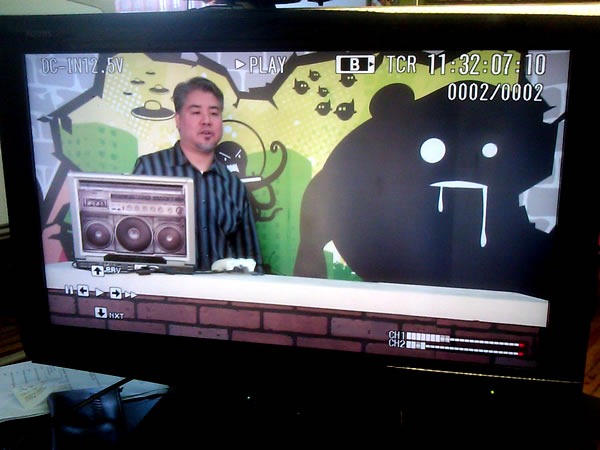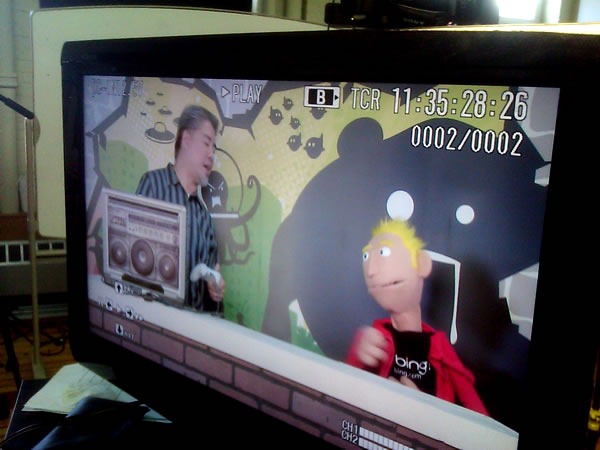Every job has its tedious part, but my job has an unusually high number of moments of pure awesomeness, such as those pictured below. I’ll explain more about the project later, but for now, enjoy the photos!





Every job has its tedious part, but my job has an unusually high number of moments of pure awesomeness, such as those pictured below. I’ll explain more about the project later, but for now, enjoy the photos!





 You’ve heard the stories about people choosing terribly obvious passwords for their various computer accounts, such as “password” and “12345”, but what are the other ones? In his book, Perfect Passwords: Selection, Protection, Authentication, Mark Burnett compiled the most common easy-to-crack passwords, most of which are ordinary words or key sequences that are easy to type on a QWERTY keyboard. I’m amused by some of the pop culture-based passwords, such as “Rush2112”, “8675309” and the X-Files inspired “TrustNo1”.
You’ve heard the stories about people choosing terribly obvious passwords for their various computer accounts, such as “password” and “12345”, but what are the other ones? In his book, Perfect Passwords: Selection, Protection, Authentication, Mark Burnett compiled the most common easy-to-crack passwords, most of which are ordinary words or key sequences that are easy to type on a QWERTY keyboard. I’m amused by some of the pop culture-based passwords, such as “Rush2112”, “8675309” and the X-Files inspired “TrustNo1”.
Someone else — I don’t who who did it — decided to turn that list into the hand-lettered poster shown above. You can click it to see it at a larger size.
In addition to being a good list showing the sort of password you shouldn’t use, it’s also a great name generator. You could take two random items from the list to create new character names for a Metal Gear game (“Tomcat Eagle1” makes just about as much sense as “Solid Snake” or “Sniper Wolf”) or any three to come up with the name of your band or prison softball team (“Bigdick Magnum Juice”).
This article also appears in The Adventures of Accordion Guy in the 21st Century.
Maybe it’s me, but I think that this setup is asking for Murphy’s Law to attack when you least expect it. However, if you’re short a laptop bag and have a hooded sweatshirt handy, this hack might work for you:

This article also appears in The Adventures of Accordion Guy in the 21st Century.
To be a Windows Phone 7 rock star, you could use your favourite rock and roll instrument to promote it like I did…

…or, if you’re a student, you can build a Windows Phone 7 application and submit it as an entry for Imagine Cup 2010. They’ve just announced a new award – the Rockstar award – for winning apps written for Windows Phone 7, using either Silverlight or XNA.
The app needs to be designed with the “consumer” in mind and should be both useful and visually compelling. You’ll need to be able demonstrate your app entry up and running, either in the emulator (which comes with the Windows Phone development tools) or on an actual Windows Phone 7 device. Windows Phone 7 is a completely new phone operating system, which means that it’s a golden opportunity for you to become one of its first developers.
According to the competition site, applications submitted will be judged based on:
Go to the Windows Phone 7 Series page, where you can get:
Check out the Windows Phone 7 Rockstar Award page on the Imagine Cup site.
“FTW” has been known to stand for many things, but in the case of the FTW! Coding Competition, it means “For The Web” (as well as “For The Win”). The FTW Coding Competition is part of our Make Web Not War event taking place on Thursday, May 27th in Montreal.
The FTW! Coding Competition is your chance to show off your web development skills and compete for some great prizes. We’re looking for people to either:
as long as it falls under one of these categories:
The prizes for the FTW! Coding Competition are:
I’m tempted to take this off the prize list and keep it for myself. It’s made up of all these goodies:
A nice package for bouncing between home and the office.
A very portable and powerful system for the coder on the go. This one’s for all you “cafe coders”!
We’re awarding bonus prizes for submitted apps that we feel worthy of the following superlatives. You can win these on their own or in combination with the first, second and third place prizes!
In order to be eligible, you have to submit your web application by Monday, May 10th, 2010 at 8:00 a.m. Eastern. So get working!
You can find out more about the FTW! Coding Competition, including all the terms and conditions of the competition, at the FTW! Coding Competition site.
 It’s Thursday, which means that it’s time for another live Ignite Your Coding webcast! Today’s guest is David Laribee, who coaches the product development team at VersionOne, has over a dozen years’ experience building enterprise software and coaching lean/agile teams in many industries. He recently wrote about technical debt in MSDN Magazine, and that’s just one of the topics he’ll cover in our live talk today.
It’s Thursday, which means that it’s time for another live Ignite Your Coding webcast! Today’s guest is David Laribee, who coaches the product development team at VersionOne, has over a dozen years’ experience building enterprise software and coaching lean/agile teams in many industries. He recently wrote about technical debt in MSDN Magazine, and that’s just one of the topics he’ll cover in our live talk today.
Ignite Your Coding is a webcast series all about helping you, the software developer. We want to help you find ways to stay on top of the technological, economic and social changes that affect you and your work every day. We contacted some of the biggest thinkers and doers in our field and asked them if they’d like to chat about the industry, how they got started, where they see the opportunities are, how they deal with change and how to be generally awesome. We hope it informs and inspires you!
You’ll need:
It’ll be posted on this blog in about a week.
This article also appears in Canadian Developer Connection.
 Last week, John Bristowe and I interviewed Jeremy Miller — “the Shade Tree Developer” – in a live Ignite Your Coding webcast. Jeremy holds the title of Chief Software Architect at Dovetail Software, Austin’s coolest ISV, and we talked about open source in the .NET world, StoryTeller, dependency injection and many other topics.
Last week, John Bristowe and I interviewed Jeremy Miller — “the Shade Tree Developer” – in a live Ignite Your Coding webcast. Jeremy holds the title of Chief Software Architect at Dovetail Software, Austin’s coolest ISV, and we talked about open source in the .NET world, StoryTeller, dependency injection and many other topics.
 In case you were wondering what Ignite Your Coding is all about: It’s all about helping you, the software developer, find ways to stay on top of the technological, economic and social changes that affect you and your work every day. We got our hands on some of the biggest thinkers and doers in our field and asked them if they’d like to chat about the industry, how they got started, where they see the opportunities are, how they deal with change and how to be generally awesome. We got some big names from the Microsoft/.NET world, but we also went farther afield and got some people from beyond that world as well, because a different perspective is often helpful.
In case you were wondering what Ignite Your Coding is all about: It’s all about helping you, the software developer, find ways to stay on top of the technological, economic and social changes that affect you and your work every day. We got our hands on some of the biggest thinkers and doers in our field and asked them if they’d like to chat about the industry, how they got started, where they see the opportunities are, how they deal with change and how to be generally awesome. We got some big names from the Microsoft/.NET world, but we also went farther afield and got some people from beyond that world as well, because a different perspective is often helpful.
The recording of our webcast with Jeremy (which took place on March 18th, 2010) is linked below, and we’ll set up RSS, Zune and iTunes feeds shortly.
Direct Download: